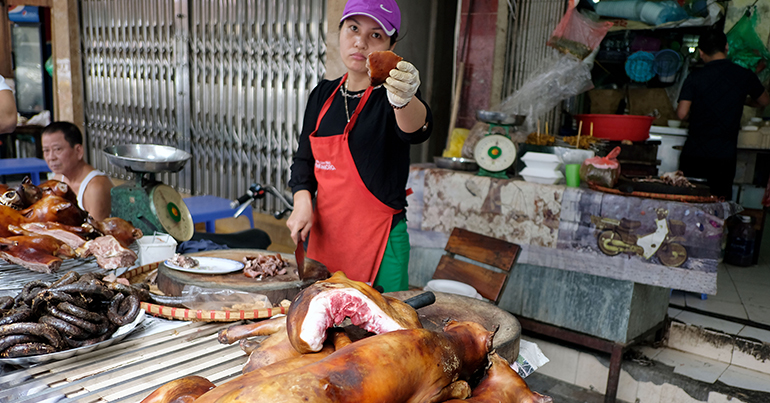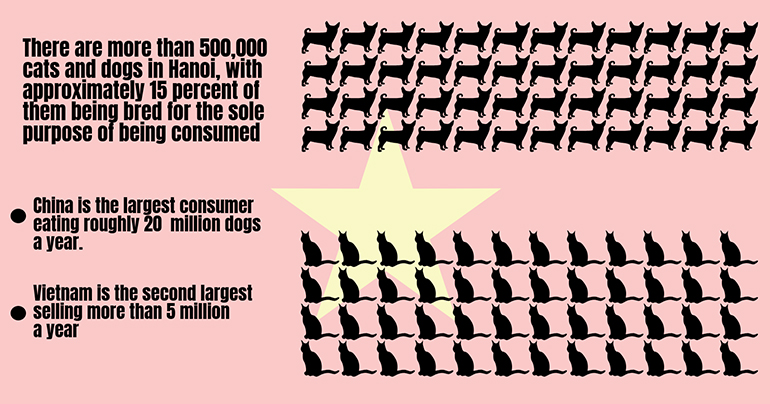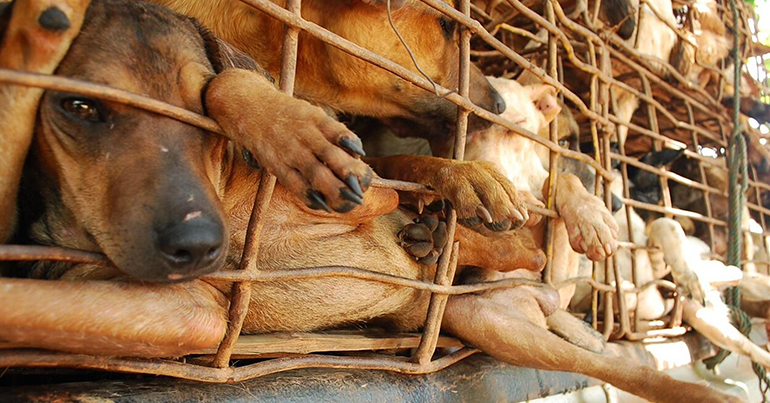The announcement came just hours after the Hanoi People’s Committee released a statement last week urging Hanoi’s citizens to “abandon the habit” of eating cat and dog meat because the practice was creating a negative image of the city among international tourists.
“Slaughtering and using dog and cat meat has created objections among tourists and international visitors living in Hanoi, affecting the image of a civilised capital,” the statement read.
Shortly after the statement’s release, the director of the city’s Department of Health, Nguyen Ngoc Son, said that officials were devising a plan to “gradually phase out the slaughtering and trading of dog meat” in Hanoi, adding that “by 2021, there will be no dog meat restaurants in the city centre”.
Officials in Hanoi launched informational campaigns last week warning locals that consumption of cats and dogs could lead to the spread of potentially deadly disease, including rabies and leptospirosis.
Thus far this year, three people have died and two more have become infected with rabies in Hanoi and according to Associated Press, the decision to ban the sale of dog meat is linked to the nation’s programme to stamp out rabies by 2021. It is estimated by Human Society International that approximately 20,000 dogs are stolen from Vietnam’s southern cities and transported to the north for sale each month, a practice which encourages the spread of rabies among the captive dogs.

Beyond health concerns, the committee also urged locals to “see value in treating animals humanely”.
The dog meat trade in Vietnam is known for being especially cruel, even relative to other animal trades; according to the animal welfare group Animals Asia, dogs in Hanoi are typically stolen off the streets or from their owners and restrained by wire nooses before being bludgeoned to death.
“The younger generation seems to be against dog and cat consumption, and there is a rise in the popularity of companion animals,” Lisa Agabian, head of communications at Animals Asia, told iNews. “We still have a long way to go, however, since some people who would not eat their own dogs or cats will happily eat others’.”
In a statement released by Thailand-based welfare group Soi Dog Foundation, the charity’s founder John Dalley lauded the decision to eventually outlaw the sale of dog meat in Hanoi, and added that he hoped similar laws would be implemented in other cities across Vietnam and Southeast Asia as a whole.
“There is no place for cruelty in culture,” he said. “Hanoi is growing into a 21st century city, and practices that belong in the dark ages should be cleared away.”
Bao Tran, Soi Dog’s representative in Vietnam, added that the news of the ban appeared to be “widely supported” by the Vietnamese people.

“The vital component now is for Hanoi to discuss and create the legal framework for banning the dog and cat meat trade,” he added.
Yet the decision to ban the sale of dog meat may indeed prove to be a controversial one. While the younger generation seems less inclined to eat cat and dog meat and the law appears to have welcomed initial support, some locals urge that eating dog meat is a tradition that should not be outlawed.
For hundreds of Vietnamese shop owners, their livelihoods depend on the sale of dog meat, which is traditionally consumed at the end of the lunar month in order to cleanse the body of accumulated bad luck. Even as dog eating becomes less popular, vendors still see booming business at the month’s end.
“If the government asks me to stop, I will stop,” a 67-year-old dog vendor told iNews last week. “But I think it will be pretty difficult to ban it, because it is traditional.”
A Hanoi butcher who has made his living selling dog for the past 20 years argued that the meat, which is both safe and delicious, should continue to have a place in Vietnam’s market.
“It’s normal to eat dog meat, it has been a Vietnamese specialty for years,” he told Asean News, adding that he doubted dog vendors would comply with the ban. “It’s still business as usual. People still eat it.”


